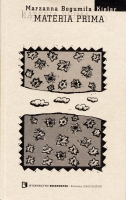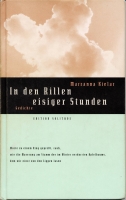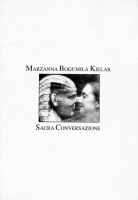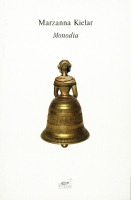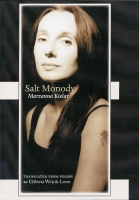Marzanna B. Kielar
Elżbieta Wójcik-Leese: "Six poems by Marzanna Bogumila Kielar" [in:] the "Diaspora" issue of Modern Poetry in Translation, UK 2004
The austerity of Marzanna Bogumiła Kielar’s mindscape compels with its monochromy. White, grey, black; chilly, cold, freezing; and occasional red. This stark concentration is strengthened by the poems’ insistent returns to the same place: northern Poland, where Kielar (born in 1963) grew up. ‘It is the landscape whose pulse and vibrations I can sense in my blood’, she admits. Though her work as a lecturer in philosophy requires her to live in Warsaw, she feels ‘an emigrant’ there. ‘My first homeland is a post-German landscape’, Kielar explains, also in connection with her interests outside poetry: ethnology, sociology, cultural anthropology. She has conducted field interviews with the inhabitants of the area (which, after WWII, witnessed the deportation of Germans and ethnic Mazurians as well as the arrival of Ukrainians and Poles) in order to investigate how these people establish an emotional bond with the space they inhabit, how they symbolically take it into possession – the questions her poetry asks.
Kielar’s poems do not directly reflect the historical concerns of Poland (like other young Polish poets who started to publish after 1989, she is freed from such responsibilities – even if she claims to be an attentive reader of Miłosz). Nor do they straightforwardly confront the canonical juxtapositions between the cultured and the primitive, as the titles of her two collections, Sacra Conversatione and Materia Prima, might suggest. Instead, they chart a uniquely intimate territory, reaching with quickened sensitivity for the metaphysical. Subtle and sensuous, they contemplate the strangeness of the world, distrusting its luscious beauty, which attracts but also misleads. This sensuality, complemented by cool, rational analysis, frequently leads critics to comparisons with Halina Poświatowska. However, Kielar herself prefers to point out her affinities with Julia Hartwig, the Polish poet of Szymborska’s generation, as well as with Elizabeth Bishop – both known for their acute observation. Just like Bishop, Kielar is adamant that there exists no division into female and male poetry, there is only good and bad poetry. She mentions Celan, Kavafy, Montale, Amichai and Tranströmer as her ‘mentors’. She also values the prose of Karen Blixen for its ‘pure, precise language’, and that of Bruno Schultz with ‘its disrupted, cracked worlds, which contain more than one universe’.
It is difficult not to notice that Kielar’s poems, too, disclose – or collapse – more than one universe. They exercise alertness: their meditative calm, luminosity, sublimity reveal, reading after reading, darker undercurrents, anxiety, urgency. They reveal truth about death or, rather, its unrelenting secrecy. Not by chance does Sacra Conversatione open with the poem of August harvesting colours, undercut by the concluding couplet: ‘soft hills stand in the luscious light,/ onto the grasses, low, death comes down’. The volume closes with ‘Winter Elegy’, which ushers Materia Prima with its icebound landscape imagery. Yet, it is the poet’s ‘mind of winter’ that helps her behold a crack, a split through which light starts seeping in: and the thaw approaches. Understanding Glaciers is Kielar’s favourite non-poetry book. (...)
(first published in the ‘Diaspora’ issue of Modern Poetry in Translation, UK, 2004)
Kielar’s poems do not directly reflect the historical concerns of Poland (like other young Polish poets who started to publish after 1989, she is freed from such responsibilities – even if she claims to be an attentive reader of Miłosz). Nor do they straightforwardly confront the canonical juxtapositions between the cultured and the primitive, as the titles of her two collections, Sacra Conversatione and Materia Prima, might suggest. Instead, they chart a uniquely intimate territory, reaching with quickened sensitivity for the metaphysical. Subtle and sensuous, they contemplate the strangeness of the world, distrusting its luscious beauty, which attracts but also misleads. This sensuality, complemented by cool, rational analysis, frequently leads critics to comparisons with Halina Poświatowska. However, Kielar herself prefers to point out her affinities with Julia Hartwig, the Polish poet of Szymborska’s generation, as well as with Elizabeth Bishop – both known for their acute observation. Just like Bishop, Kielar is adamant that there exists no division into female and male poetry, there is only good and bad poetry. She mentions Celan, Kavafy, Montale, Amichai and Tranströmer as her ‘mentors’. She also values the prose of Karen Blixen for its ‘pure, precise language’, and that of Bruno Schultz with ‘its disrupted, cracked worlds, which contain more than one universe’.
It is difficult not to notice that Kielar’s poems, too, disclose – or collapse – more than one universe. They exercise alertness: their meditative calm, luminosity, sublimity reveal, reading after reading, darker undercurrents, anxiety, urgency. They reveal truth about death or, rather, its unrelenting secrecy. Not by chance does Sacra Conversatione open with the poem of August harvesting colours, undercut by the concluding couplet: ‘soft hills stand in the luscious light,/ onto the grasses, low, death comes down’. The volume closes with ‘Winter Elegy’, which ushers Materia Prima with its icebound landscape imagery. Yet, it is the poet’s ‘mind of winter’ that helps her behold a crack, a split through which light starts seeping in: and the thaw approaches. Understanding Glaciers is Kielar’s favourite non-poetry book. (...)
(first published in the ‘Diaspora’ issue of Modern Poetry in Translation, UK, 2004)




